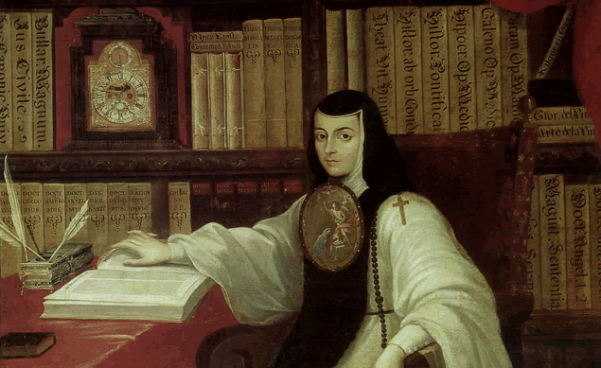What if the only way you could pursue an education and have time to write was to take a vow of abstinence and poverty and enter a monastery or convent? That was the decision Juana Inés de Asbaje y Ramírez de Santillana made when she became Sor Juana Inés de la Cruz (Sister Juana Inés of the Cross) to pursue studies and writing poetry in Colonial Mexico. For a woman or man in the 21st Century, who has access to education and the freedom to write, that path is difficult to imagine. But I think Virginia Woolf would understand, who championed the idea of a “Room of One’s Own” as a key resource for a writer.
Sor Juana was born in 1648 to parents Isabel Ramírez de Santillana and Captain Pedro Manuel de Asuaje y Vargas-Machuca. Juana Inés was a child prodigy who began to read at three years old. When her parents split up, she, her sister and mother lived with her maternal grandfather. Juana Inés studied her grandfather’s extensive library. When he passed away, Juana Inés went to live in the capital with her mother’s sister. There Juana Inés famously learned Latin in 20 lessons. This allowed her to read books about philosophy, science and religion. She wanted to dress like a man to go to University but her family forbade it. Her intellect was celebrated in the court of the Viceroy. Señorita Juana Inés spent time as a lady in waiting for his wife Leonor María Correto. The two women were very close friends. Although Juana Inés received several marriage proposals, she preferred her independence and freedom to study.
In 1667, she entered a Carmelite convent; in 1669 she changed to the less strict Convent of Santa Paula of the Order of San Jerónimo. Her rooms in the Convent included a library where she collected some 4000 books; one of the largest libraries in the Americas at the time. She studied, met with intellectuals, and wrote poetry, philosophy, plays and music. Her poems were published in Spain. Sor Juana taught drama and music in the convent school.
In 1690, after her powerful friends the former Viceroys left for Spain, the Archbishop of Puebla betrayed her confidence by publishing her critique of a priest’s sermon without her permission. Then the archbishop wrote an anonymous letter where he criticized Sor Juana’s secular writings. Her brilliant reply to that letter championed education for all girls and women. Pressure from the church forced Sor Juana to stop writing and studying non-religious topics. She sold her library of books to earn alms for the poor. Sor Juana died in 1695 after attending to her convent sisters suffering from the plague.
Hers was the best life possible for a 17th Century female writer. Even now, women often begin writing upon their retirement from their first careers when their children are grown, if they have chosen to have kids. I wonder at our progress.

Sor Juana remains honored as one of the foremost women writers in Latin America. She is known as the “tenth muse.” Her image is on the Mexican 200 Peso Bill ($10 bill). What woman in United States history might hold that sort of honor? (Hope Harriet Tubman will be portrayed on the $20 in 2026 as planned.) Who would you like to see on the US $10 bill? Imagine Maya Angelou, Sandra Cisneros or Willa Cather…
Gracias for visiting Fake Flamenco. Olé! –Rebecca


What an amazing woman! Thanks for sharing.
LikeLiked by 2 people
Thank you for reading and commenting Rosaliene. : ) Sor Juana is an inspiration; where there’s a will, there’s a way.
LikeLiked by 1 person
Yes, Sor Juana Inés de la Cruza was a strong and courageous woman indeed. It seems she was clear about what she wanted from life–first and foremost, to write, and then to teach and serve others–and made the best choices available to her at the time in order to see her desires realized.
LikeLiked by 3 people
Thanks for your comment, Henry. Yes, her clarity of purpose was very strong and her intellect was top notch. -Rebecca
LikeLiked by 1 person
I love your posts Rebecca, I always discover something or somebody I had never heard of before. So enriching! ¡Muchas gracias! 🙂
LikeLiked by 1 person
Muchas gracias a ti! I appreciate your comments. They mean a lot to me. Thanks! -Rebecca
LikeLike
Isn’t it Interesting to see that holy orders often provided women a route to an education. What an admirable woman.
LikeLiked by 1 person
Thanks for your comments, Mom! xo
LikeLike
A fascinating post, once again!
LikeLiked by 1 person
Thanks for your kind words, Graham!
LikeLike
She was quite talented. The only woman in Mexico to have a banknote all by herself.
(Frida Kahlo has to share with Diego Rivera)
The only poem I know of her comes back to mind:
En perseguirme mundo, ¿qué interesas?
¿En qué te ofendo cuando sólo intento poner bellezas
En mi entendimiento y no mi entendimiento en las bellezas?
LikeLiked by 2 people
Thanks for your comments. You’re right! Only Mexican woman with a bank note of her own. Not too shabby! -Rebecca
LikeLiked by 1 person
🙂
LikeLiked by 1 person
wow! how fascinating! I cant imagine that but back then it was the done thing I guess!
LikeLiked by 1 person
Thanks for reading and commenting Carol Anne! It means a lot to me. Can you imagine, it’s like Hamlet, Get thee to a nunnery!
LikeLiked by 1 person